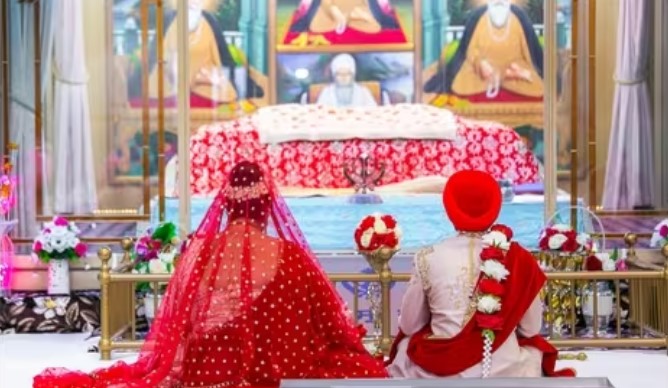Anand Marriage Act implemented in Jammu & Kashmir
Detailed rules were framed by the Jammu and Kashmir administration for registration of marriages under the Anand Marriage Act, which provides statutory recognition to marriage rituals of Sikhs, fulfilling their long-standing demand to not have to solemnise their marriages under the Hindu Marriage Act.
The emergence of the Anand Marriage Act dates back to 1909 when the British Imperial Legislative Council passed a legislation for the recognition of the Sikh wedding ceremony Anand Karaj. The Act aimed to acknowledge and respect the customs and practices of the community.
Also Read: Protesting Job Aspirants Lathicharged in Jammu
The emergence of the Anand Marriage Act dates back to 1909 when the British Imperial Legislative Council passed a legislation for the recognition of the Sikh wedding ceremony Anand Karaj. The Act aimed to acknowledge and respect the customs and practices of the community.
‘Jammu and Kashmir Anand Marriage Registration Rules, 2023’ were framed for the registration of “Anand marriages”, under which tehsildars concerned shall be the registrar of such marriages within their respective territorial jurisdiction, as per a government notification issued.
Sikh couples can apply for registration within a period of three months after solemnising their marriage but face late fee if formalities are completed after the expiry of the deadline, reads the notification issued by the department of law, justice and parliamentary affairs on November 30.
“This has been a long pending demand and we are thankful to the Lt Governor for keeping his promise,” said vice president of the District Gurudwara Parbandhak Committee, Jammu, Balvinder.
He said the implementation of the Anand Marriage Act has made the community happy as they “were facing an identity crisis due to the non-availability of a separate Sikh Marriage Act”.
The emergence of the Anand Marriage Act dates back to 1909 when the British Imperial Legislative Council passed a legislation for the recognition of the Sikh wedding ceremony Anand Karaj. The Act aimed to acknowledge and respect the customs and practices of the community.
In 2012, the Parliament passed the Anand Marriage (Amendment) Bill, bringing Sikh traditional marriages under the purview of legal recognition.
While the central government approved the amendments, it was left for individual states and Union territories to frame respective rules for the registration of Anand marriages.




